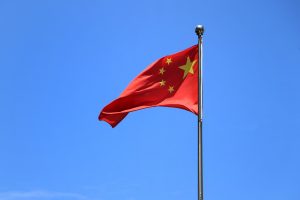China held its second vice ministerial-level “special meeting on COVID-19” with Pacific Island countries (PICs) on November 30. The virtual meeting was co-chaired by China’s Vice Foreign Minister Zheng Zeguang and the Solomon Islands’ Foreign Minister Jeremiah Manele.
According to a readout from China’s Foreign Ministry, the meeting was attended by the 10 PICs with which China has diplomatic relations: Fiji, Samoa, Papua New Guinea, Vanuatu, the Federated States of Micronesia, the Cook Islands, Tonga, Niue, the Solomon Islands, and Kiribati. The Marshall Islands, Nauru, Palau, and Tuvalu all recognize the Republic of China government on Taiwan. Both the Solomon Islands and Kiribati established relations with Beijing (and severed official ties with Taipei) in the fall of 2019, the most recent states to make the switch.
During the video conference, Zheng and his counterparts in the Pacific “reviewed the significant achievements of their cooperation on combating COVID-19,” which was lauded for helping deepen the “comprehensive strategic partnership between China and Pacific Island Countries.” But there were a number of asides on non-pandemic related topics, including the ritual reaffirmation of the “One-China principle” and a pledge of “mutual support on issues involving each other’s core interests and major concerns.” China also offered assistance for the Pacific Islands on climate change, an existential issue for many of the low-lying island states.
The Pacific Island states have remained largely unscathed amid the COVID-19 outbreak, thanks to their ability and willingness to shut down international travel to prevent outbreaks. However, the border closures have taken a devastating toll on local economies, many of which depend heavily on tourism.
The meeting on November 30 was just the latest continuation of China’s COVID-19 diplomacy in the Pacific. As Denghua Zhang outlined in an article for the ANU Department of Pacific Affairs, as of early October China had provided nearly $2 million in aid to PICs as well as donations of medical supplies like face masks. Chinese medical teams have also traveled to the region. “Clearly, the Chinese government is attempting to turn the COVID-19 crisis into a new diplomatic opportunity, with a whole-of-government approach deploying diplomats, aid officials and official media in full swing,” Zhang wrote. However, he also noted that the pandemic – and associated border closures – have jeopardized China’s relations in the region due to decreased tourism and investment flows as well as potential delays to existing development projects – the major pillars of Chinese influence.
The video conference also inadvertently served as evidence that China’s focus on the Pacific Islands is not top level. Zheng, the vice minister of foreign affairs responsible for North America, Oceania, and Latin America, represented Beijing in the talks, not Foreign Minister Wang Yi. And on an issue of pressing concern to the PICs – access to a COVID-19 vaccine – Zheng’s comments fell far short of a concrete commitment to the region specifically. Instead, he said “China reaffirmed the commitment of making the development and deployment of COVID-19 vaccine, when available, a global public good, as part of its contribution to vaccine accessibility and affordability in developing countries, including Pacific Island Countries.” That lags behind China’s commitment to make various other partners (like Pakistan and African countries) “priority” recipients of a future vaccine.
It also doesn’t measure up to Australia’s more concrete commitment to provide COVID-19 vaccines to its regional partners – something Prime Minister Scott Morrison reiterated in comments to the media on November 30, the same day as the China-PIC meeting. Australia had previously made a commitment to provide A$500 million toward distributing and administering vaccines in Pacific Island countries. The difference between that and China’s vague offer highlights the differing priorities levels ascribed to the Pacific Island region by Beijing and Canberra.

































